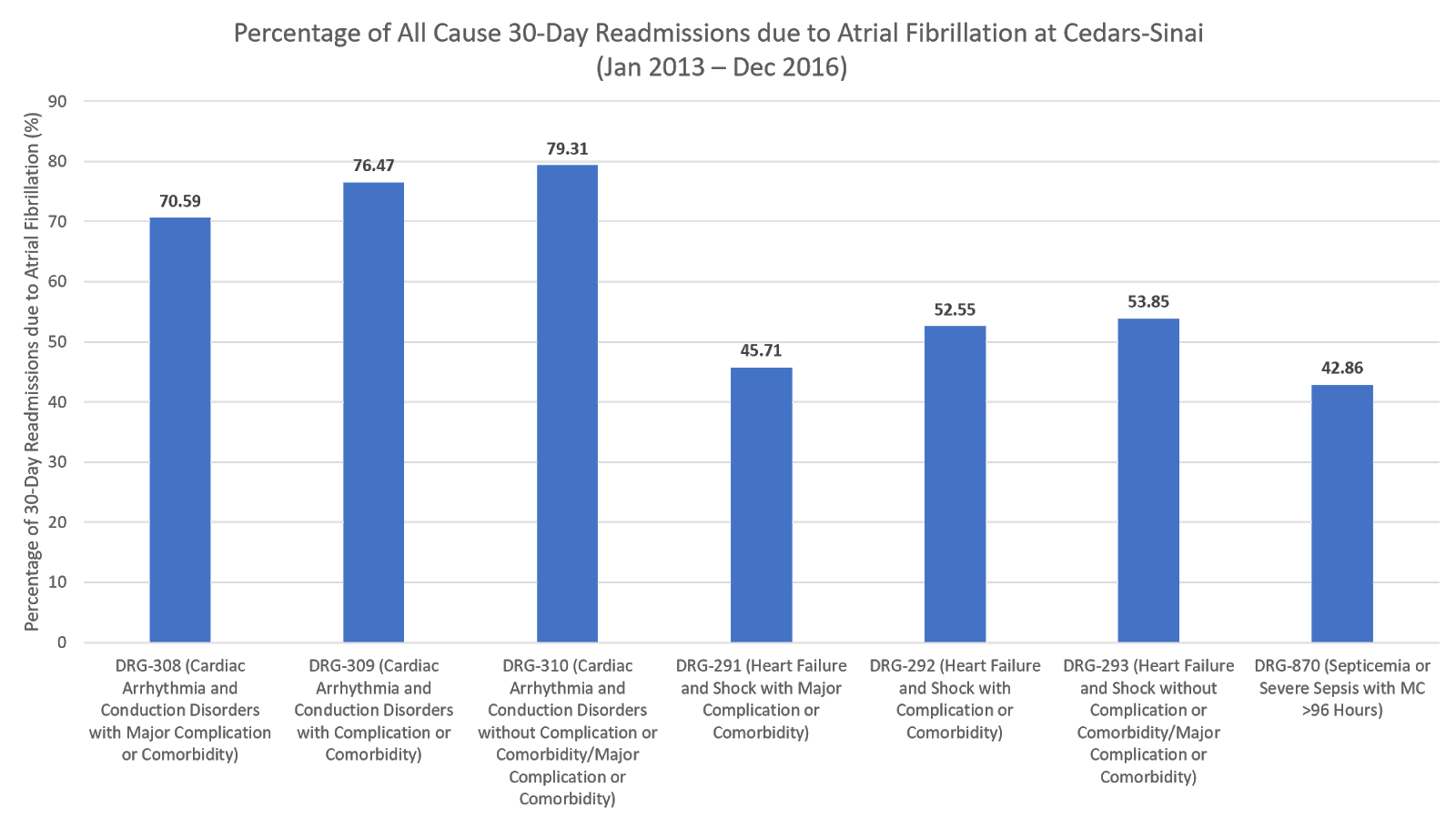Bristol-Myers Squibb’s Eliquis Could Impact Heart Failure and Cardiac Arrhythmia Patients Readmitted with Atrial Fibrillation at Cedars-Sinai
In Eliquis, Atrial fibrillation (AFib)
Get Dexur’s Personalized Hospital Specific Presentation on Quality, Safety, Compliance & Education
By: Saparja Nag Mar. 20, 2018
Eliquis, produced by Bristol-Myers Squibb, was approved by the FDA in early 2013 to treat patients with nonvalvular atrial fibrillation in order to reduce their risk of stroke and systemic embolism. Dexur analysts were able to identify key patient populations by condition that had a significant proportion of AFib (atrial fibrillation) readmissions out of all readmissions at Cedars-Sinai. These patients that are readmitted with AFib within 30 days of an index hospital visit, that may or may have been related to AFib may benefit a great deal from Eliquis.
Dexur examined patients with index hospitalizations from each of the departments at Cedars-Sinai to determine the percentage of all-cause readmissions to AFib. For example, 23.39% of all readmissions of Medicare inpatients were due to AFib. 40.66% of readmitted cardiovascular patients returned with AFib, while 29.94% of pulmonary patients readmitted were for AFib. There was only one other department other than cardiovascular and pulmonology that had a higher percentage of AFib readmissions out of all cause readmissions; dermatology patients had 41.54% of all readmissions due to AFib. Dermatology, however, had the lowest number of all-cause readmissions at just 65, which is significantly lower than the 3,143 all-cause readmissions of cardiovascular patients and 972 readmissions of pulmonology patients. This large difference in readmission volume makes the comparison of dermatology to the cardiovascular and pulmonology metrics less relevant.
This readmission rate analysis was also performed at the DRG-level for both cardiovascular and pulmonology disciplines. The diagnosis-related group at Cedars-Sinai with the highest percentage of readmissions with AFib was DRG-310 (Cardiac Arrhythmia and Conduction Disorders without Complication or Comorbidity/Major Complication or Comorbidity) at 79.31%. Among the three DRGs included in cardiac arrhythmia and conduction disorders, the lowest percentage of readmissions due to AFib was in DRG-308 (Cardiac Arrhythmia and Conduction Disorders with Major Complication or Comorbidity) at 70.59%. This suggests that cardiac arrhythmia patients without CC/MCC were being readmitted the most often for AFib, more than cardiac arrhythmia patients with MCC. DRG-309 (Cardiac Arrhythmia and Conduction Disorders with Complication or Comorbidity) had 76.47% of readmissions due to AFib.
In addition to cardiac arrhythmias, a number of other DRGs at Cedars-Sinai had a high percentage of readmissions due to AFib. Two heart failure DRGs, DRG-292 (Heart Failure and Shock with Complication or Comorbidity) and DRG-293 (Heart Failure and Shock without Complication or Comorbidity/Major Complication or Comorbidity) each had over half of all their readmissions due to AFib. DRG-291 (Heart Failure and Shock with Major Complication or Comorbidity) had 45.71% of their readmissions from AFib as well. Another high AFib-readmitting DRG was DRG-870 (Septicemia or Severe Sepsis with MC >96 Hours), for which 42.86% of readmissions were due to AFib. Conditions for which a high percentage of all readmissions were due to AFib may have some underlying similarities in their propensity to develop atrial fibrillation. Patients with cardiac arrhythmias, heart failure and shock, and septicemia may therefore be prime candidates for Eliquis.

DEXUR PRO MEMBERS GET ACCESS TO:
- Total discharge volume, readmission volume, and percentage of all cause 30-day readmissions due to atrial fibrillation at Cedars-Sinai for all inpatients, by surgical status, and department of index hospitalization
ABOUT THE AUTHOR
